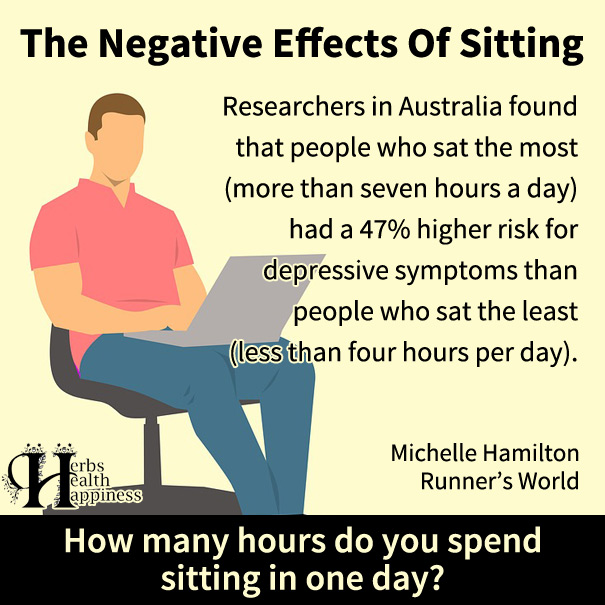Please follow us on Telegram to be sure to receive our latest posts!

The Negative Health Effects Of Too Much Sitting. Graphic © herbshealthhappiness.com
Modern lifestyle has greatly increased the amount of sitting that people do every day. Many people spend most of their waking lives sitting! This is not how we evolved; as hunter-gatherers, we were on our feet most of the time. Here is a list of some of the surprising health consequences that have been associated with too much sitting by scientific studies:
Gain Weight: If you sit for long hours watching TV or any other activity that involves sitting, you are more like to be obese and overweight as you do not spend calories doing some physical work or exercise.
Anxiety: By engaging in screen-based activities, you are more likely to have less sleep that can make you depressed and anxious. You also detach from friends while sitting at home that can lead to social anxiety. [1]
Cardiovascular Risks: Sitting too much or sedentary behavior has been associated with cardiovascular problems. A review has linked a lack of physical activity and increased sitting time with cardiovascular mortality risk. [2]
Premature Death: The chances of premature death increases in individuals who spend a lot of time sitting without any exercise. A study recommends workstation alternatives for people sitting too much in offices to avoid premature deaths [3] – for example standing desks and various forms of ‘desk exercisers’ – for example a treadmill or under-desk pedalling exerciser.
Diabetes Risk: Most people don’t realize that sitting can change the way the body reacts to insulin, the hormone which is responsible to burn sugar. During sitting, you also burn fewer calories. Epidemiological data suggests that too much sitting can increase the risk of diabetes. [4]
Deep Vein Thrombosis: This is a blood clot that occurs in a vein, typically in a leg vein. This is a potentially very dangerous condition as the blood clot can move to the lungs, leading to pulmonary embolism. Thrombosis has been associated with long periods with little movement – for example long travel times, being confined to bed – and of course long periods of sitting. Prevention tips for avoiding DVT include maintaining a healthy weight, staying hydrated, taking regular walks and getting up to move around every hour or so.
Chronic Disease Risk: Sitting too much has been associated overall with an increased risk for multiple chronic diseases including cardiovascular diseases, diabetes, breast , and colon cancer. [5]
Learn More:
Why Sitting Down All Day Is Killing You + 7 Tips To Save Your Health: https://herbshealthhappiness.com/why-sitting-down-all-day-is-actually-killing-you/
References:
[1] Dunstan, D.W., et al., Too much sitting–a health hazard. Diabetes research and clinical practice, 2012. 97(3): p. 368-376. https://www.sciencedirect.com/science/article/abs/pii/S0168822712002082
[2] Dunstan, D.W., A.A. Thorp, and G.N. Healy, Prolonged sitting: is it a distinct coronary heart disease risk factor? Current opinion in cardiology, 2011. 26(5): p. 412-419. https://journals.lww.com/co-cardiology/Abstract/2011/09000/Prolonged_sitting___is_it_a_distinct_coronary.8.aspx
[3] Huysmans, M.A., et al., Is sitting too much bad for your health? Ergonomics in design, 2015. 23(3): p. 4-8. https://journals.sagepub.com/doi/abs/10.1177/1064804615585410
[4] Dempsey, P.C., et al., Sitting less and moving more: improved glycaemic control for type 2 diabetes prevention and management. Current diabetes reports, 2016. 16(11): p. 114. https://link.springer.com/article/10.1007/s11892-016-0797-4
[5] Owen, N., A. Bauman, and W. Brown, Too much sitting: a novel and important predictor of chronic disease risk? British journal of sports medicine, 2009. 43(2): p. 81-83. https://bjsm.bmj.com/content/43/2/81.short
😳 What Tinnitus Does To Your Brain Cells (And How To Stop It)
After 47 years of studies and countless brain scans done on more than 2,400 tinnitus patients, scientists at the MIT Institute found that in a shocking 96% of cases, tinnitus was actually shrinking their brain cells.
As it turns out, tinnitus and brain health are strongly linked.
Even more interesting: The reason why top army officials are not deaf after decades of hearing machine guns, bombs going off and helicopter noises…
Is because they are using something called "the wire method", a simple protocol inspired by a classified surgery on deaf people from the 1950s...
★ How To Get Rid Of Nail Fungus:
★ Does Your Salad Contain This Vegetable?
★ 20 Natural Painkillers In Your Kitchen (Video):
★ Men's Prostate Health:

2. Famous Chef Sheds 60lbs Researching New Paleo Recipes: Get The Cookbook FREE Here
3. #1 muscle that eliminates joint and back pain, anxiety and looking fat
4. 7 odd foods that KILL your abdominal fat (surprising fat-fighters)
5. The TRUTH about bread (Will surprise you!)
6. [PROOF] Reverse Diabetes with a "Pancreas Jumpstart"
7. Here's What Happens When You "Unlock Your Hip Flexors"
8. The #1 WORST food that CAUSES Faster Aging (beware -- Are you eating this?)
The #1 Muscle That Eliminates Joint And Back Pain, Anxiety And Looking Fat
By Mike Westerdal CPT
Can you guess which muscle in your body is the #1 muscle that eliminates joint and back pain, anxiety and looking fat?
This is especially important if you spend a significant amount of time sitting every day (I do, and this really affects me in a big way!)
Working this "hidden survival muscle" that most people are simply not training because no-one ever taught them how will boost your body shape, energy levels, immune system, sexual function, strength and athletic performance when unlocked.
If this "hidden" most powerful primal muscle is healthy, we are healthy.
Is it...
a) Abs
b) Chest
c) Glutes
d) Hip Flexors
Take the quiz above and see if you got the correct answer!
P.S. Make sure you check out this page to get to know the 10 simple moves that will bring vitality back into your life:
If you enjoyed this page:












